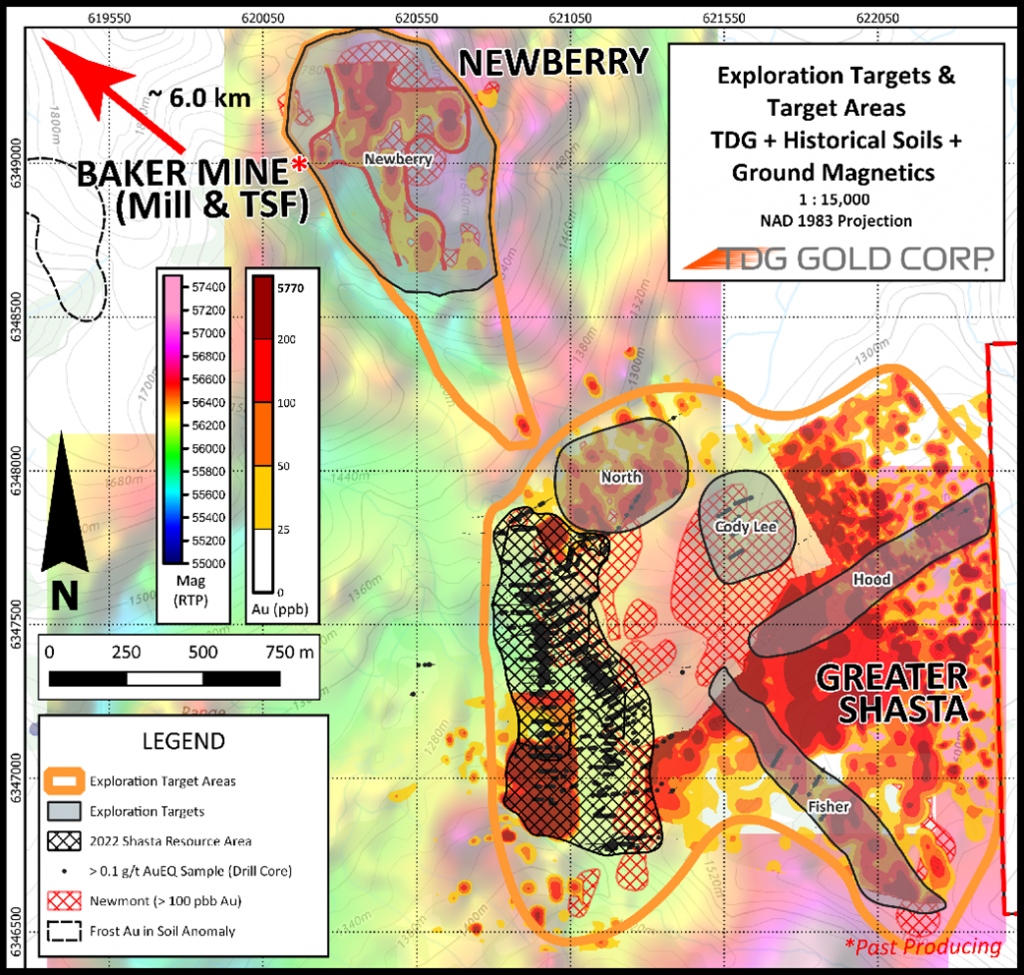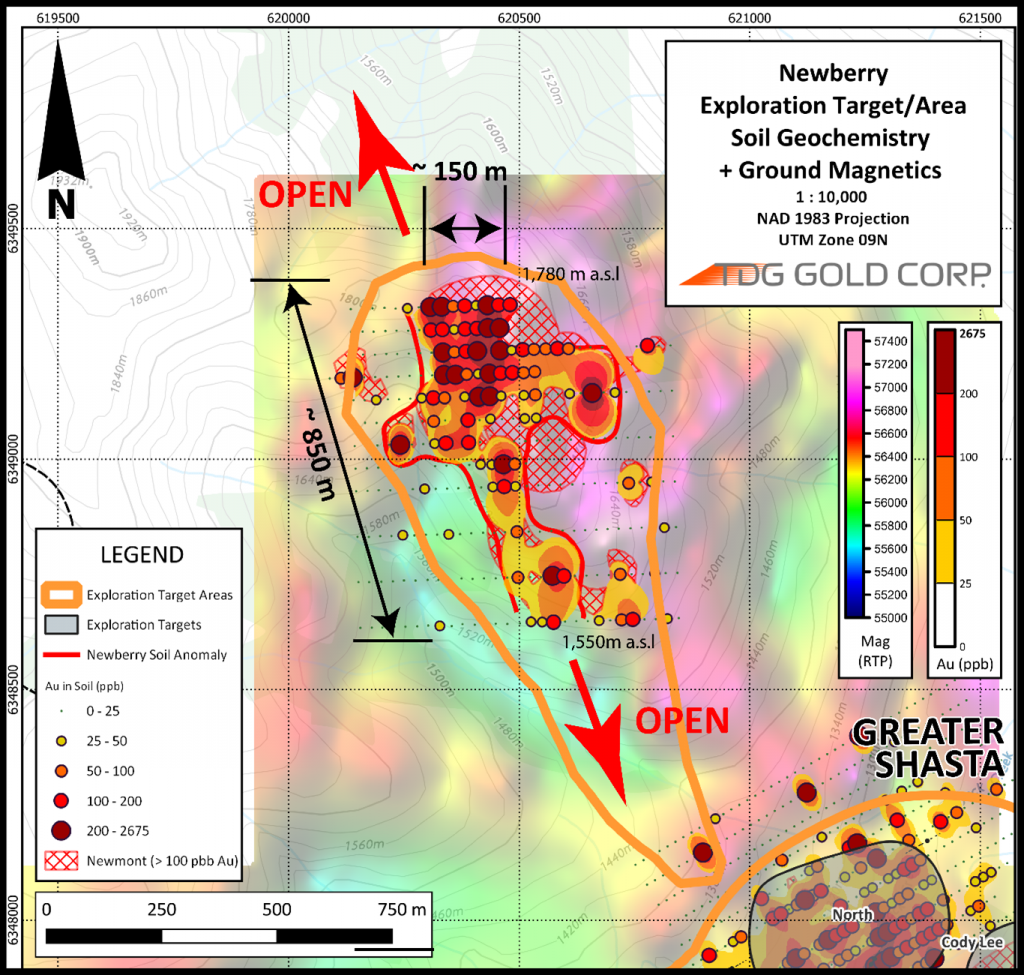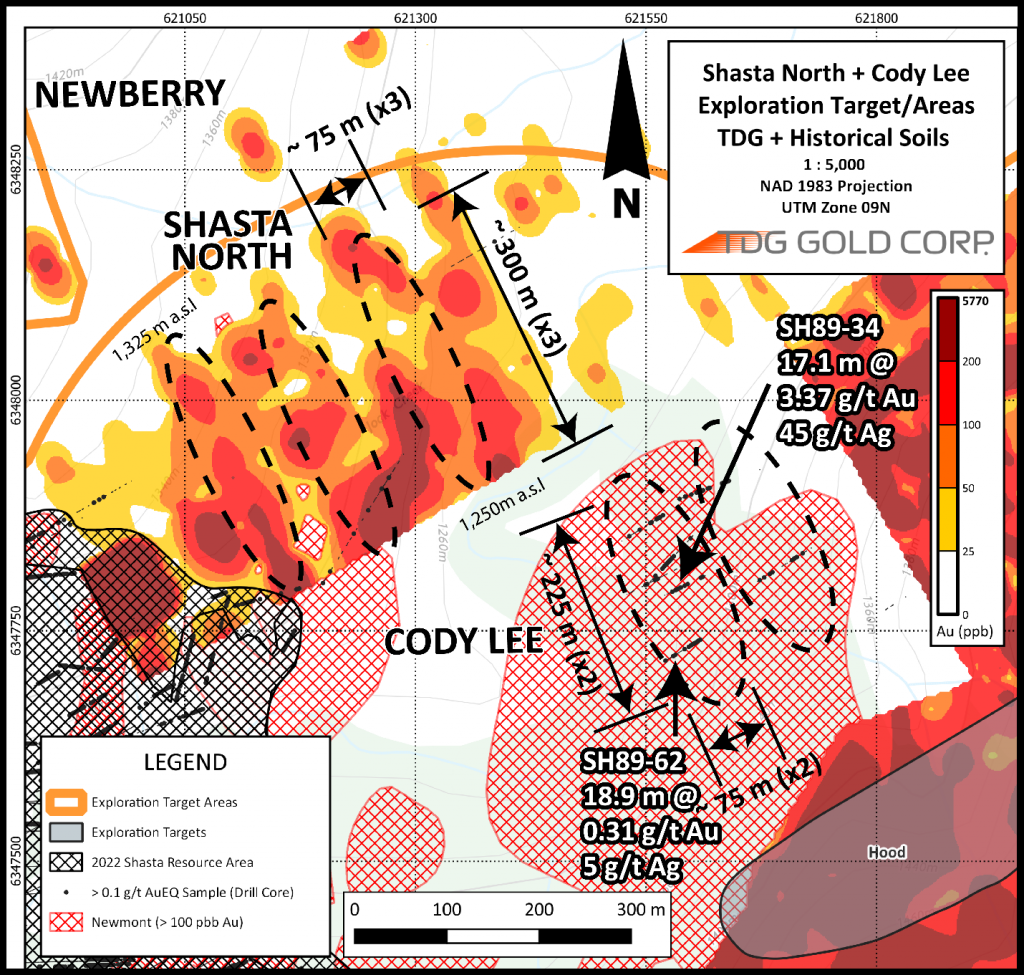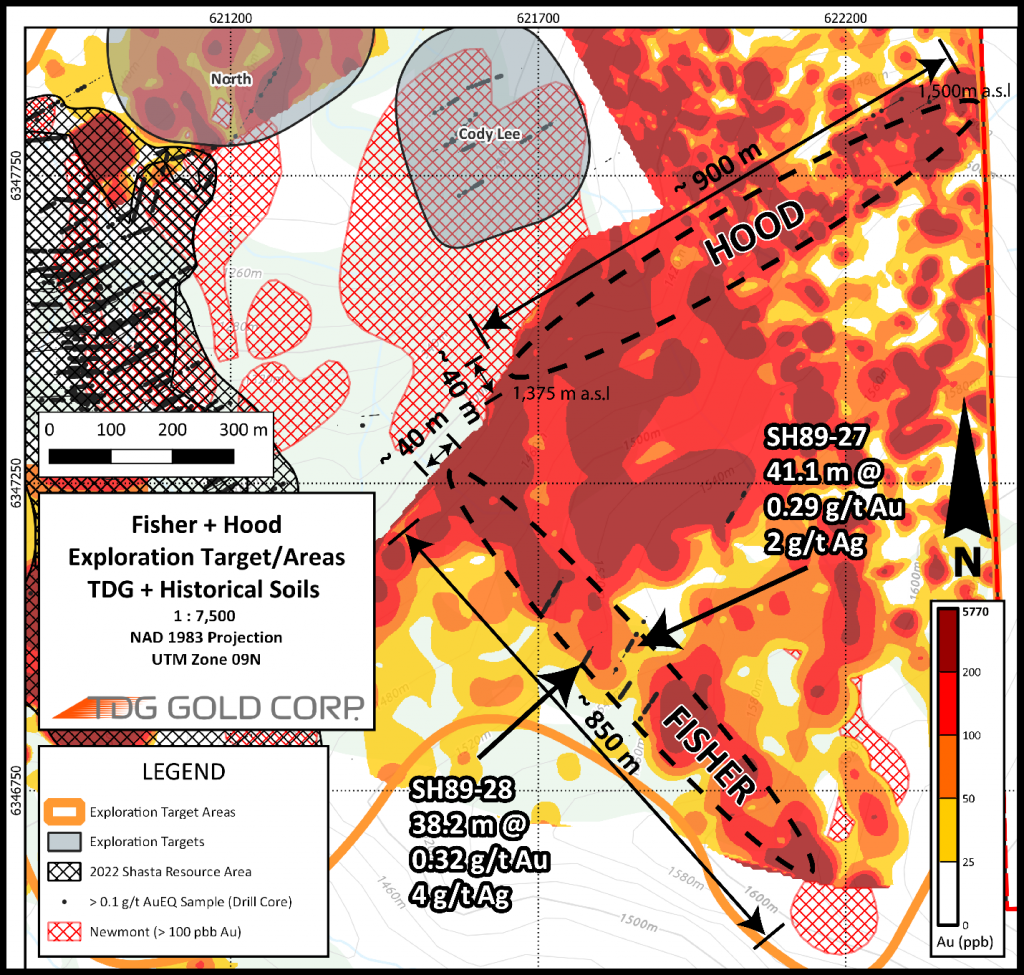TDG GOLD DELINEATES 5 DRILL-READY EXPLORATION TARGETS AT GREATER SHASTA-NEWBERRY
White Rock, British Columbia, January 25, 2023 – TDG Gold Corp – (TSXV: TDG) (the “Company” or “TDG”) has outlined five high-priority, drill-ready exploration targets within the Greater Shasta and Newberry areas that are in addition to the Shasta deposit where TDG has defined a mineral resource. The Newberry and Greater Shasta exploration targets are located approximately 6 kilometres (“km”) southeast of TDG’s former producing Baker mine, mill and tailings storage facility, which are road accessible via TDG’s Baker mine road.
The five exploration targets are comprised of one in the Newberry exploration target area (Newberry) and four in the Greater Shasta exploration target area (North, Cody Lee, Fisher and Hood). Each of these exploration targets have been defined based on integration of available drillhole, geological, geophysical, and other exploration data and the deposit-type model for the area. TDG considers these targets to have the greatest potential for the discovery and definition of additional gold-silver deposits in close proximity to the existing Shasta mineral deposit.
Fletcher Morgan, TDG’s CEO, comments: “The Newmont discovery team knew back in 1984 that there was potential for a larger mineralized system encompassing both the Greater Shasta and Newberry areas, but mineral tenure issues stifled progress at the time. By replicating that team’s exploration approach, we’ve been able to define five drill-ready, high-priority exploration targets outside of our existing mineral resource at Shasta. These targets all merit drill testing. Meanwhile, in parallel, we plan to start taking the same systematic approach to defining exploration targets at our Baker project. TDG has now assembled the exploration team to do both.”

The Newberry exploration target focuses on 0.5 square kilometres (“sq.km”) within the 1.25 sq.km Newberry exploration target area in which TDG has delineated a higher priority zone for drill testing (Figure 2). The Greater Shasta exploration targets cover approximately 1.0 sq.km within the recently expanded 5.5 sq.km Greater Shasta exploration target area and further work has delineated multiple drill targets within it (Figure 3: Cody Lee & Shasta North Exploration Targets; Figure 4: Fisher & Hood Exploration Targets).
Newberry Exploration Target
There is strong geochemical support for the Newberry exploration target but the target has never been drill tested. A large multielement Au + silver (“Ag”) + lead (“Pb”) + zinc (“Zn”) + copper (“Cu”) soil geochemical anomaly is defined by: (i) > 100 parts per billion (“ppb”) Au , (ii) > 50 parts per million (“ppm”) Ag, (iii) > 100 ppm Pb, (iv) > 200 ppm Zn and locally anomalous barium (“Ba”). The coincident multi-element soil geochemical anomaly measures 100-350 metres (“m”) wide (average approximately 150 m) x 850 m long and extends to the limits of the grid in the north-northwest and south-southeast directions.

The geochemical anomaly coincides with a steep magnetic gradient (Figure 2) and an airborne magnetic susceptibility low, and may reflect the presence of an important mineralizing structure and potentially related destruction of magnetite by hydrothermal alteration. The magnetic features are also coincident with a strong linear resistivity gradient and conductive zone defined by Fraser Filtered Very Low Frequency (“VLF”) from the 2022 geophysical program (link). The VLF anomaly, which is directly coincident with the soil anomaly, extends to north and south to the limits of the geophysical survey and is at least 1 km long, suggesting the feature may extend beyond the limits of the soil survey (i.e. open along strike in both directions).
Based on the soil geochemistry and geophysical anomalies, the best defined portion of the Newberry exploration target has dimensions of 150-200 m in width, 500-850 m of potential strike length and is exposed over a vertical extent of 100-225 m.
Greater Shasta: Shasta North and Cody Lee Exploration Target
The Shasta North Exploration Target lies on the north side of Jock Creek and is opposite, and likely along strike of, the Cody Lee Target Area on the south side of Jock Creek. Geochemical support for the Shasta North Exploration Target consists of a large 350 m x 400 m Au in soil geochemistry anomaly overlying an area of intense silicification and quartz stockworks and heavy iron-oxide staining in outcrops along the base of a steep slope to the north. The large equant soil anomaly contains several linear north-northwest striking ‘fingers’ (Figure 3) with higher Au concentrations that potentially represent structures and/or more intense alteration zones. The westernmost ‘finger’ corresponds to the southern extent of the strong geophysical features present at the Newberry Target and just northeast of the JM Zone in the main Shasta Deposit. Two historical small diameter and only partially assayed shallow drillholes were drilled into portions of this soil anomaly and intersected weak precious metals mineralization but may have been oriented inappropriately to test the volcanic stratigraphy and structures adequately. The widespread and intense silicification in this area is somewhat different than alteration elsewhere in the project area and may represent a lithocap over a larger hydrothermal system.
The best-defined portions of the Shasta North Exploration Target has approximate dimensions of 75 m wide, 600-900 m along strike and is exposed over 50-75 m vertical extent.
The Cody Lee Exploration Target is supported by both surficial soil geochemical sampling results and several shallow, short, small diameter drillholes completed by previous operators. The zone lies adjacent to a 350 m x 350 m Au in soil anomaly and is poorly exposed along a steep slope and roadcuts through glacial overburden. Several drillholes outlined and only partially tested at least three north-northwest striking quartz-carbonate vein and stockwork zones coincident with a historical soil anomaly and mapped alteration along the roadcuts and in old trenches.
The drill data is limited and assaying is spotty and the source and true strike and dip of the source of the Cody Lee soil anomaly is unknown. Mapping along the feature suggests it strikes north-northwest and is likely steeply dipping to the north. Based on the soils, geophysical anomalies and available drill data, the best defined portions of the Cody Lee Exploration Target (Figure 3) has approximate dimensions of 100-150 m in width, 300-450 m along strike and is exposed over 100-150 m of vertical extent.

Greater Shasta: Fisher and Hood Exploration Targets
Geochemical support for the Fisher Exploration Target (Figure 4) consists of a large linear Au in soil geochemical anomaly up to approximately 90 m wide x 800 m long, which is open to the north and south. The northern extent merges with and intersects a nearly perpendicular up to 120 m wide x 800-1,000 m long west-southwest trending Au in soil anomaly which has been named the ‘Hood Exploration Target’.
The Fisher Exploration Target is coincident with a linear airborne magnetic susceptibility low (1.1 km long and 200 m wide) that likely reflects the destruction of magnetite and other primary mafic minerals by hydrothermal fluids associated with the vein systems and stockworks present.
Approximately 250 m of the strike length of the coincident soil and geophysical features corresponds to two parallel north-northwest trending, southwest dipping mineralized zones present in previous historical small diameter scout drilling. The lower lens has an apparent true thickness of approximately 25-45 m and the upper lens approximately 10-15 m and can be traced down dip approximately 250 m. These zones appear to dip approximately 45 degrees or less to the southwest and define a 250 m long segment within the trace of the longer 850 m combined soils and geophysical feature. The drilling to date at the Fisher Exploration Target did not adequately test the soil geochemistry and geophysical anomaly nor fully define its geometry but, based on available data, the Hood Exploration Target is 30-40 m wide, extends 250-800 m along strike and extends up to 125 m vertically.

Airborne geophysical surveys, as well as 2022 ground magnetics and VLF survey work, suggest the Hood Exploration Target feature may continue to the west-southwest and may intersect the JM Zone within the Shasta Deposit based on 2022 field reconnaissance and interpretation of drill data at the Shasta mineral resource area.
The bedrock source and true strike and dip of the source of soil anomaly at the Hood Exploration Target (Figure 4) is unknown. Mapping along the feature suggests there is a fault zone parallel to, and likely coincident with, the soil anomaly and is likely steeply dipping to the north, or potentially vertical. Based on these results, the target may range from 30-40 m in width, extend over a strike length of approximately 900 m and could extend down dip for 100-150 m.
Qualified Person
The technical content of this news release has been reviewed and approved Steven Kramar, MSc., P.Geo., Vice President, Exploration for TDG Gold Corp., a qualified person as defined by National Instrument 43-101.
Gold equivalent (AuEq) is used for illustrative purposes, to express the combined value of Au and Ag as a percentage of Au. Calculations are uncut and no allowances have been made to accommodate potential recovery losses that would occur in a mining scenario. AuEq is calculated using 80:1 silver to gold ratio.
Cautionary Language
This news release includes historical information that has been reviewed by the Company’s geological team and qualified person. The Company’s review of the historical records and information reasonably substantiate the validity of the information presented in this news release; however, the Company cannot directly verify the accuracy of the historical data, including the procedures used for sample collection and analysis. There is insufficient exploration on these prospects to define a mineral resource. It is uncertain if after additional exploration a mineral resource will be delineated. Therefore, the Company encourages investors to exercise appropriate caution when evaluating these results.
Exploration Target Areas and Exploration Targets such as Newberry and those within the Greater Shasta area (excluding the Shasta mineral resource area) are considered early-stage exploration projects that do not contain any mineral resources defined in accordance with CIM Guidelines and NI 43-101. The potential dimensions disclosed herein are conceptual in nature and there has been insufficient exploration to define a mineral resource for the exploration targets disclosed. It is uncertain if further exploration will result in these exploration targets being delineated as a mineral resource.
About TDG Gold Corp.
TDG is a major mineral claim holder in the historical Toodoggone Production Corridor of north-central British Columbia, Canada, with over 23,000 hectares of brownfield and greenfield exploration opportunities under direct ownership or earn-in agreement. TDG’s flagship projects are the former producing, high grade gold-silver Shasta, Mets and Baker mines, which are all road accessible, produced intermittently between 1981-2012, and have over 65,000 m of historical drilling. The projects have been advanced through compilation of historical data, new geological mapping, geochemical and geophysical surveys, and at Greater Shasta, over 13,000 metres of modern HQ drill testing of the known mineralization occurrences and their extensions. In May 2022, an initial Mineral Resource Estimate was published for 0.3 sq.km of the 5.5 sq.km exploration target area at Greater Shasta (see TDG news release dated May 17, 2022), with additional infill and step-out drilling having been undertaken in 2022, for which assays are pending. TDG aims to undertake follow-up exploration and diamond drilling on high priority exploration targets in 2023.
ON BEHALF OF THE BOARD
Fletcher Morgan
Chief Executive Officer
For further information contact:
TDG Gold Corp.,
Telephone: +1.604.536.2711
Email: info@tdggold.com
Neither TSX Venture Exchange nor its Regulation Services Provider (as that term is defined in the policies of the TSX Venture Exchange) accepts responsibility for the adequacy or accuracy of this release.
This news release contains forward-looking statements that are based on the Company’s current expectations and estimates. Forward-looking statements are frequently characterized by words such as “plan”, “expect”, “project”, “intend”, “believe”, “anticipate”, “estimate”, “suggest”, “indicate” and other similar words or statements that certain events or conditions “could”, “may” or “will” occur. Such forward-looking statements involve known and unknown risks, uncertainties and other factors that could cause actual events or results to differ materially from estimated or anticipated events or results implied or expressed in such forward-looking statements. Such factors include, among others: the actual results of current exploration activities; the ability to define mineral resources within the exploration targets, conclusions of economic evaluations; changes in project parameters as plans to continue to be refined; possible variations in ore grade or recovery rates; accidents, labour disputes and other risks of the mining industry; delays in obtaining governmental approvals or financing; and fluctuations in metal prices. There may be other factors that cause actions, events or results not to be as anticipated, estimated or intended. Any forward-looking statement speaks only as of the date on which it is made and, except as may be required by applicable securities laws, the Company disclaims any intent or obligation to update any forward-looking statement, whether as a result of new information, future events or results or otherwise. Forward-looking statements are not guarantees of future performance and accordingly undue reliance should not be put on such statements due to the inherent uncertainty therein.